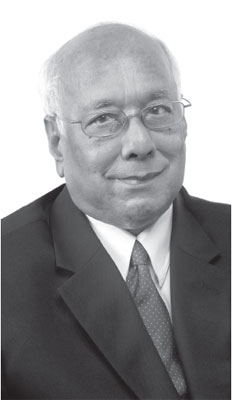
 Among our six honorees this year is Dr Elisha Tikasingh, a scientist who has received numerous awards for his work in parasitology, entomology and arbovirology. Dr Tikasingh will be conferred with the DSc and will address graduates of the Faculties of Science and Technology, and Food and Agriculture at their joint ceremony on the morning of October 24. He shared some thoughts with editor, Vaneisa Baksh. Among our six honorees this year is Dr Elisha Tikasingh, a scientist who has received numerous awards for his work in parasitology, entomology and arbovirology. Dr Tikasingh will be conferred with the DSc and will address graduates of the Faculties of Science and Technology, and Food and Agriculture at their joint ceremony on the morning of October 24. He shared some thoughts with editor, Vaneisa Baksh.
VB: You say you are a boy from the bush; what made the boy transfer to a laboratory; or would you say it was a bush lab?
ET: Being born in the “bush” you live in close harmony with nature so you have an inclination to study biology, but when I went to high school at Naparima College, biology was not taught at that time. I had to go abroad for my tertiary education and biology in general became my prime interest, specializing in the study of parasites. Why parasites? When I was little boy hookworm disease was very common in Trinidad and when I studied parasites I found the lifecycle of hookworms (and subsequently other parasites) to be very fascinating. When I completed my PhD degree I received a fellowship from the Rockefeller Foundation to study arboviruses (viruses transmitted by insects, ticks and mites) at the Trinidad Regional Virus Laboratory. Most of these viruses have wild mammals and birds as hosts so I was back in the bush collecting wild animals and blood-sucking arthropods and taking them back to the laboratory to test for the presence of arboviruses.
VB: What was your role in the first island-wide yellow fever vaccination programme in the late 1970s?
ET: The first island-wide yellow fever vaccination programme actually took place in 1955 as there was an outbreak of yellow fever at that time after an absence of 40 years. Then there was an epizootic (an outbreak amongst animals) in Howler monkeys in the Guayaguayare forest between 1977 and 1978. At the time the newspapers were reporting that the monkeys were being poisoned. I suggested yellow fever to colleagues at the Caribbean Epidemiology Centre (CAREC) and officials of the Government. When we did further research, my colleagues and I actually found the virus in mosquitoes and the monkeys. That discovery sent the Government officials into an island-wide vaccination programme which was assisted by the Immunization Unit at CAREC. However, I did not actually participate in the vaccination programme.
VB: What would you say has been your most important contribution to humankind?
ET: Research work is like building blocks; you build on the work of other researchers and others will build on your work. It is not easy to say how my research on various subjects will help ‘humankind’ at this juncture, only the future will tell. Having said that I think one of my most important projects was one where I developed a technique to produce large amounts of hyperimmune ascitic fluids which were used to help identify unknown arboviruses. Many arbovirus laboratories in other countries used the technique developed by me and my colleagues.
VB: What does this honorary degree mean to you?
ET: Sometimes a scientific researcher works quietly in his laboratory hoping he will make a contribution to science and not thinking about rewards and awards, so when he is awarded an honorary doctorate at the end of his career, it’s like icing on the cake. Sometimes it is not easy to judge the quality of your own work, nor how it would help other researchers, so that being awarded with an honorary DSc suggests that your life’s work has been recognised. I will always cherish this honour from UWI. |





